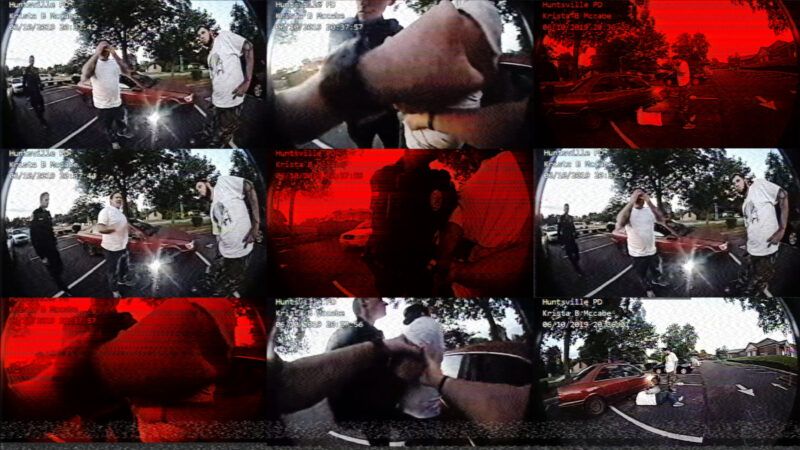Alabama Cops Who Arrested Mechanic for Not Giving Them His ID Denied Qualified Immunity
"The police are free to ask questions, and the public is free to ignore them," wrote a federal judge.

A federal court has sided with Roland Edger, an Alabama man who says he was wrongfully arrested after he declined to give police officers his driver's license in 2019. While a lower court had granted qualified immunity to the officers, the U.S. Court of Appeals for the 11th Circuit overturned that decision, ruling that the officers clearly violated Edger's Fourth Amendment rights and that Edger's suit against them may go forward.
In June 2019, Edger, a mechanic in Huntsville, Alabama, received a call from a customer, who told him that his wife's car had broken down and asked him to come out to repair it. The car was in the parking lot of a local church, where the customer's wife worked. The customer told Edger he could pick up her keys at the church's front desk.
When he arrived at the church on June 10, a few days after the customer had called, Edger retrieved the keys from the church and began inspecting the car. According to the ruling, Edger says he believed something was wrong with the car's steering or tires and that he'd need to return with the necessary tools to fix the vehicle.
When he returned that evening, joined by his stepson, the church's security guard called 911, telling dispatchers "I have two Hispanic males, messing with an employee's car that was left on the lot."
Police arrived around 30 minutes later and began questioning Edger. Officer Krista McCabe asked Edger what he was doing; Edger replied that he was working on a customer's car.
"All right. Take a break for me real fast," McCabe said, according to body camera footage of the incident. "Do y'all have driver's license or IDs on you?"
"I ain't going to submit to no ID," Edger replied. "Listen, you call the lady right now. Listen I don't have time for this. I don't mean to be rude, or ugly, but—" he was cut off by McCabe, who insisted that he needed to provide an ID.
"I'm telling you that if you will call this lady that owns this car," Edger began to reply, when another officer, Cameron Perillat, grabbed Edger from behind and handcuffed him, saying "We don't have time for this."
Despite Edger repeatedly offering his driver's license upon being handcuffed, the officers arrested him anyway and charged him with "obstructing governmental operations" for failing to provide his ID. The charges were later dropped.
Edger filed a lawsuit, claiming that the officers violated his Fourth Amendment rights.
The officers argued that Edger had violated an Alabama law that requires individuals to tell officers their name, address, and "an explanation of his actions," if there is a reasonable suspicion of a crime. However, the statute does not compel individuals to show a diver's license or ID card.
The suit was originally dismissed when the District Court for the Northern District of Alabama granted the officers qualified immunity, a legal doctrine that protects government officials from civil rights lawsuits unless they violated a "clearly established" law. But last week, the U.S. Court of Appeals for the 11th Circuit reversed that decision, holding that "the plain text of the Alabama statute is so clear that no reasonable officer could have believed they could arrest Mr. Edger for failing to produce his 'ID' or 'driver's license.'"
"The Alabama statute is clear. It lists only three things that the police may ask about," wrote Judge Charles R. Wilson in the court's unanimous opinion. "This is not an issue of 'magic words' that must be uttered. There is a difference between asking for specific information: 'What is your name? Where do you live?' and demanding a physical license or ID. The information contained in a driver's license goes beyond the information required to be revealed under" Alabama state law.
While Alabama police can require individuals to identify themselves in some circumstances, they're not entitled to get a formal ID card, and they're not entitled to get answers beyond the narrow questions the law requires.
"It has been clearly established for decades prior to Mr. Edger's arrest that the police are free to ask questions, and the public is free to ignore them," wrote Wilson. "Any legal obligation to speak to the police and answer their questions arises as a matter of state law."


Show Comments (62)